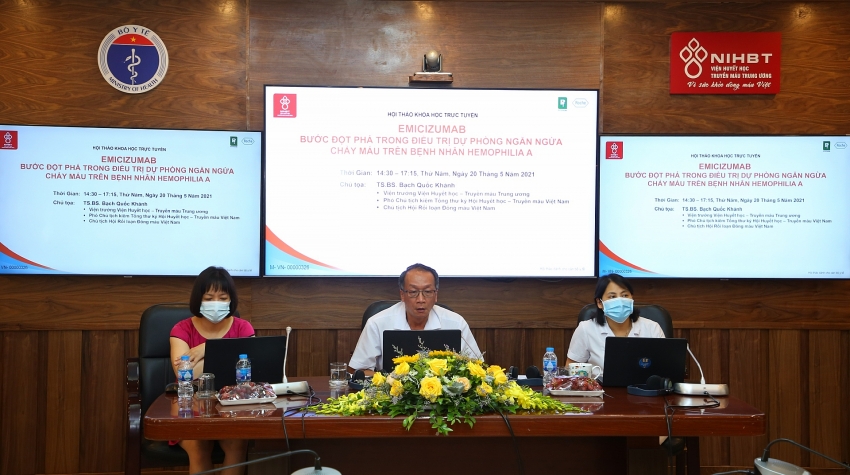New prophylaxis treatment for Hemophilia A patients in Vietnam
 |
| The conference on the new prophylaxis treatment for Hemophilia A patients was held in Hanoi on May 20 |
The conference with the topic “New prophylaxis treatment for Hemophilia A patients” was held by the National Institute of Hematology and Blood Transfusion in collaboration with Roche Vietnam.
Hemophilia is an inherited genetic disorder that impairs the body’s ability to make blood clots, caused by decreased or abnormal function of coagulation factor VIII and IX. Over 6,200 people are estimated to live with hemophilia in Vietnam, of whom nearly 40 per cent have not been diagnosed or treated.
Hemophilia can cause a person to bleed even without being injured for a long duration and repeated re-bleeding. Currently, there is no long-term cure for hemophilia. If it is not detected early, diagnosed, and treated properly, the bleeding episodes will deform the muscles and joints, causing pain and difficulty in movement and affecting the quality of the patient’s life significantly. If the bleeding occurs in risky areas, it can be fatal to the patient.
Although hemophilia cannot be completely cured, early diagnosis and appropriate treatment can help the patient to maintain their health and have an almost normal life. Therefore, enhancing diagnosis work, early detection and treatment quality is an urgent priority that can help the patient to have a better quality of life.
Girish Mulye, general director of Roche Pharma Vietnam, emphasised: “As one of the leading companies in pharmaceuticals and diagnostics, Roche aspires to deliver better outcomes for more patients faster. Therefore, we constantly focus on scientific research to find and introduce breakthrough treatment methods. On this occasion, we are proud to accompany the National Institute of Hematology and Blood Transfusion to bring new hopes and opportunities for Hemophilia A patients. This is also a part of the company's long-term commitment to improving quality of life for patients, reducing the complications and fatal rate caused by this disease.”
At the moment, Vietnam has 10 hemophilia treatment centres. The advanced treatment methods in the world are gradually being upgraded in Vietnam and they have proved to be effective.
The latest method of Hemophilia A prophylaxis
According to the recommendations of the World Federation of Hemophilia, prophylaxis helps patients to limit bleeding, prevent, and effectively reduce complications caused by the disease.
Prof. Guy A Young, Keck School of Medicine, University of Southern California, said: "Studies have shown that the new method with emicizumab for the prophylaxis of Hemophilia A has overcome the limitations of existing methods, as it helps to maintain a low bleeding rate in Hemophilia A patients of all ages.”
The longer duration of treatment with emicizumab, the lower the annual bleeding rate, the higher the percentage of patients that stop bleeding. Emicizumab does not pose a direct threat of developing an inhibitor of factor VIII. At the same time, the use of emicizumab through subcutaneous injection was also noted to be well-tolerated during the long-term with no new safety concerns and the patient's quality of life was significantly improved.
Dr. Bach Quoc Khanh, director of the National Institute of Hematology and Blood Transfusion, chairman of the Vietnam Hemophilia Association said: "Prophylaxis by regularly supplementing clotting factors to prevent bleeding has been applied in many countries in the world for many decades. The early detection and prophylaxis is the best way to reduce risks for patients as well as saving treatment cost and reducing the burden for the health insurance fund. If prophylaxis can be deployed on a large scale and supported by health insurance, it will create a better future for patients."
The prophylaxis treatment for Hemophilia A patients has been approved in 101 countries.
| • Hemophilia is a genetic disorder caused by a deficiency of clotting factors in a chain of 12 factors that generate coagulation. There are two main types of hemophilia: Hemophilia A (due to factor VIII deficiency) and Hemophilia B (due to factor IX deficiency). Of these, Hemophilia A is the more common type, accounting for 80 per cent of the cases. • The disorder is relatively rare. It affects about 1 in 10,000, mainly due to inherited genes from parents. About 30 per cent of patients have no family history of hemophilia, which is thought to be a normal genetic mutation that turns into a disease gene and passed on to the next generation. |
What the stars mean:
★ Poor ★ ★ Promising ★★★ Good ★★★★ Very good ★★★★★ Exceptional
Themes: Healthcare Platform
- Opella and Long Chau join forces to enhance digestive and bone health
- Hanoi intensifies airport monitoring amid Nipah disease risks
- Cosmetics rules set for overhaul under draft decree
- Policy obstacles being addressed in drug licensing and renewal
- Sanofi, Long Chau Pharmacy relaunch medicine blister pack collection initiative
Related Contents
Latest News
More News
- Vietnam-South Africa strategic partnership boosts business links (February 06, 2026 | 13:28)
- Mondelez Kinh Do renews the spirit of togetherness (February 06, 2026 | 09:35)
- Seafood exports rise in January (February 05, 2026 | 17:31)
- Accelerating digitalisation of air traffic services in Vietnam (February 05, 2026 | 17:30)
- Ekko raises $4.2 million to improve employee retention and financial wellbeing (February 05, 2026 | 17:28)
- Dassault Systèmes and Nvidia to build platform powering virtual twins (February 04, 2026 | 08:00)
- The PAN Group acquires $56 million in after-tax profit in 2025 (February 03, 2026 | 13:06)
- Young entrepreneurs community to accelerate admin reform (February 03, 2026 | 13:04)
- Spring Fair 2026 launches national fair series (January 30, 2026 | 16:17)
- SnP celebrates 10th anniversary with new brand identity (January 30, 2026 | 14:41)

 Tag:
Tag:

























 Mobile Version
Mobile Version